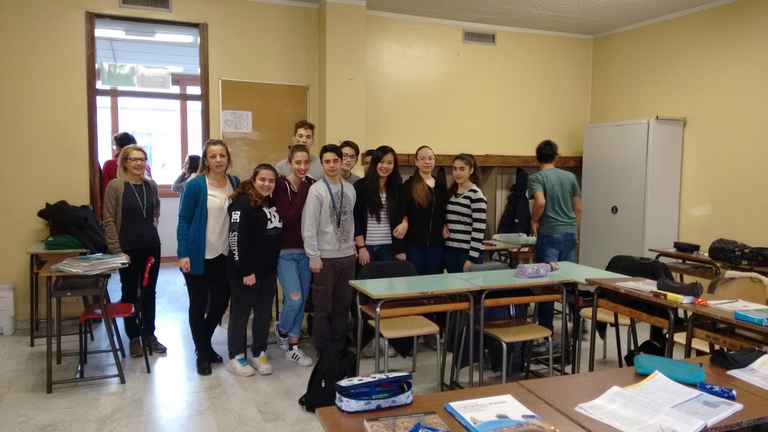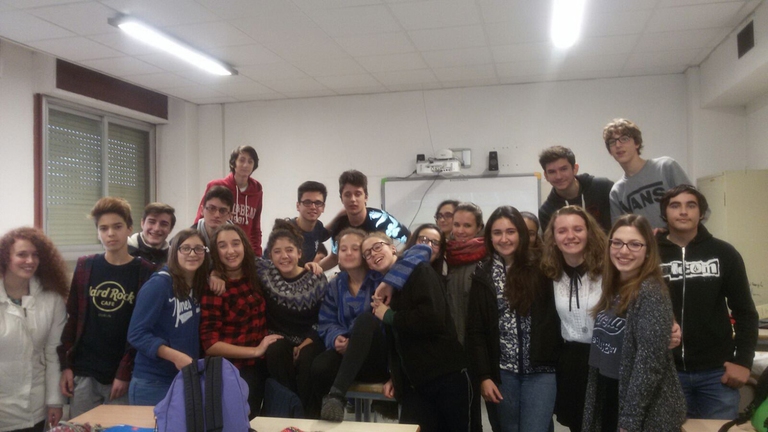
Kalongo Hospital in Uganda is on high alert. Medics are facing the pandemic amid an already precarious healthcare situation, in a country with only 55 intensive care beds.
Pegaso, the project co-financed by the European Union and aimed to redefine the teenagers’ relationship with food and sport, really gets going: how are the adolescents reacting?
Some tested the app to judge bars and restaurants, some played the “serious game”, some wore the gadgets to test if they were comfortable: in April 2016 the three pre-pilot phases of the project Pegaso – Fit 4 Future will be concluded.
The aim of the initiative, which lasted three year and a half and was coordinated by the Department of Design at the Politecnico di Milano and the Fondazione Politecnico di Milano, is to promote sustainable behaviours and educate children to adopt healthy food habits and do regular physical exercise in order to fight against teenage obesity.
How? Through technology. In the pre-pilot phases, adolescents have tested everything, from the E-diary app that tracks what they eat every day, to the Pegaso places app that let them discover where the services related to the project are located (for example swimming pools and gyms); from virtual games that promote a less sedentary lifestyle to the Smart T-shirt that monitors the teenagers’ physiological parameters using special sensors.
Only volunteer high-school students aged 14 to 16 coming from Catalonia (Spain), England and Scotland (UK) and Lombardy (Italy), who are accustomed to use electronic devices and have a good knowledge of English, participated in the pre-pilot phases. In Italy, the high schools involved are the second level college of science “Elio Vittorini” and the polytechnic school “Giulio Natta”, Milan.
Every school tested a specific part of the project. At the end of each phase, the students discussed their experience, providing useful feedbacks on the comfort and appearance of the gadgets or sensors and the practicality and usefulness of the app and the services offered by Pegaso.
“The students were intrigued by this new experience that is very close to their world and the way they communicate,” says Cristina Adriani, who teaches 2 M, a second grade class at the Natta polytechnic school that participated in the project. “They considered the idea interesting and the said that the possibility to connect their mobiles to other devices such as the T-shirts with sensors was original. The teachers” she added, “were glad to see the students’ enthusiasm for all new technologies and had the opportunity to reflect on the need to include technologies in all disciplines.”
According to Claudia Papini, who teaches the 2 G at the Vittorini science college “the frequent use of technological devices dissuades teenagers from doing physical exercise; Pegaso’s bet is to use these devices to promote a healthy lifestyle. Our students embraced the project with interest and curiosity: they’re part of a European project, they move, register, share: this is no small thing!”
In the testing phase, students provided many ideas linked to the game, from graphics to game controls and the definition of the game objective. All these aspects have been included in a report that – once provided to developers – will help to further improve the services offered by Pegaso: the goal is being prepared when the pilot phase, which will involve other young students, will start in the next academic year.
Siamo anche su WhatsApp. Segui il canale ufficiale LifeGate per restare aggiornata, aggiornato sulle ultime notizie e sulle nostre attività.
![]()
Quest'opera è distribuita con Licenza Creative Commons Attribuzione - Non commerciale - Non opere derivate 4.0 Internazionale.
Kalongo Hospital in Uganda is on high alert. Medics are facing the pandemic amid an already precarious healthcare situation, in a country with only 55 intensive care beds.
Indigenous peoples in the isolated region are suffering from poor access to health, with several cities becoming hotspots of coronavirus in the Amazon. Indigenous leaders, health experts and NGOs are calling for international help.
The government believes it’s on the right track to addressing the coronavirus in Bangladesh. But millions don’t have enough food and as most hospitals refuse patients with a fever and cough, the poor are dying.
The coronavirus in Africa could completely overwhelm healthcare systems neglected for years. Yet Zambia has refrained from imposing the type of far-reaching lockdown seen in nations such as South Africa.
The city of Guayaquil in Ecuador has become the coronavirus epicentre in Latin America, offering a dire warning of what could happen throughout the region. People are dying so fast that bodies are left in their homes, or in the streets, for days.
These days her phone hasn’t stopped ringing but Ilaria Capua continues sharing her knowledge to spread information about the novel coronavirus. In this interview she highlights the importance of sustainability.
The consequences of the novel coronavirus or Covid-19: what are the symptoms, what the death toll is, whether there’re a cure, how China has been affected. And why it’s been labelled an emergency also in economic terms.
Natural remedies can be very helpful when it comes to not feeling cold in winter: here are some ways to keep the body warm, at home and outdoors, including what to eat to increase body heat.
The kambo medicine uses the secretion of the green tree frog. We speak to Tanja Lucev, who organises kambo retreats in Guatemala, about the benefits of the traditional shamanic experience.









